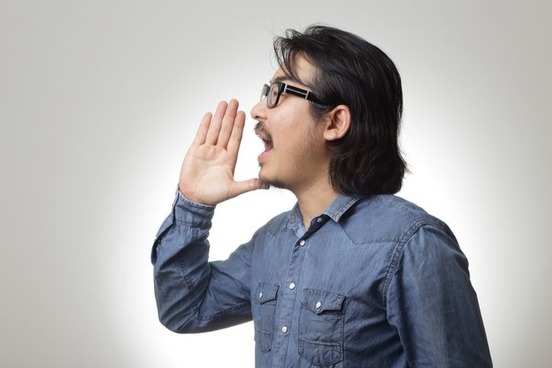One thing I’ve taken note of while living in Brazil, is that Brazilians have no idea how to use the slang term “word,” which is extremely common in informal American use of English. Are you one of them?
If you didn’t already know of these five uses for “word” then you’re like 99.9% of all non-native English speaker, but today you can move on step closer.
Word means more than just “palavra.” Besides meaning a group of letters that make up sentences, word also has many other meanings.
“Word,” when used correctly, can be one of the most colorful and versatile words in the English language. Similar to the word “fuck,” “word” can be used to mean many different things. It is one of the rare words that can mean exact opposites, depending on context, tone, and body language.
“Word” is also one of the most complicated words in the English language, simply because it has so many uses. To tell the difference between it’s many uses, you really need to pay attention to the context and intonation of the speaker.
Informal Uses of “Word”
1. Word can mean okay or just to communicate that you heard them.
- “I’ll be there in 5 minutes.”
“Word.” - “I’m going to the store, I’ll be back later.”
“Word.”
Note: Here it’s usually said quickly and indifferently.
2. Word can mean cool, like:
- “I got an A on my test.”
“Word.”
Note: Here it’s used with a little more excitement, and it’s a little more drawn out.
3. Word can be used in an annoyed or indifferent way, like yeah, whatever:
- “Hey man, you forgot to clean up.”
“Word.” - “I’m going to hang out with John (someone you don’t like).”
“Word.”
Note: Here it’s used often with the roll of the eyes, and in annoyed sound in their voice. It’s also a little drawn out.
4. Word can be used to show disbelief, like “really?”:
- “Yo, I got a new car.”
“Word?!”
5. Word up is also sometimes used, but it has a slightly different meaning. It can mean I agree with what you’re saying, usually with some enthusiasm.
- “Real Life English is amazing!”
“Word up!”
6. To put words in your mouth means to falsely or inaccurately report what you said.
- “Hey man, that’s not what I said. You’re putting words in my mouth.“
7. To take the words out of my mouth means I was thinking the exact same thing.
- “I was just about to say that! You took the words right out of my mouth.”
8. Word on the street is a rumor or piece of information that is currently being talked about.
- “Word on the street is Chad has a fan club.”
9. Word to the wise is a hint or brief explanation given.
- “Word to the wise, don’t go through the favelas in a BMW.”
Less Informal Uses of “Word”
10. To give your word means to tell the truth:
- “Will you be here when I get back? Give me your word.”
11. Don’t take my word for it is to trust what is being said:
- “Papaya is delicious, but don’t just take my word for it, try it yourself.
12. Keep your word, do what you have promised.
- “Josh gave his word to not eat meat for 30 days.
- “Remember Josh, you said you would go on a vegetarian diet for 30 days, keep your word.
13. To have a word is to have a quick conversation, to speak briefly.
- “I have some news, can I have a word with you real quick?”
14. In other words, to express something in a different way. In other words is often abbreviated as i.e.
- “I got drunk at the bar last night, so in other words I’m getting better at holding my liquor.”
15. Just say the word means I am at your service, just tell me when you want to be served.
- “Would you like some water?”
“Not now, maybe later.”
“Just say the word.”
16. Word of mouth is when Information passed through people talking, not through the written language.
- “Capoeira was passed down through word of mouth.”
17. Words fail me / at a loss for words means to be unable to speak. Often used to express disbelief or dismay.
- “Words fail me, I don’t know what to say…” or “I can’t believe he did that, I’m at a loss for words…”
18. In your own words means to say it as you think it.
- In your own words, what does chapter 12 say?
Conclusion
Word is a dynamic, colorful word that is used quite often in both the spoken and written language of English. Because of it’s versatility, proper usage will make the speaker seem quite advanced.
To get some practice using these different phrases, feel free to make a comment putting one of more of these different uses into practice and have your work corrected by a native speaker.
Another important thing you can do is just pay attention to the way it’s used in films and TV shows. Plus, if you live in Belo Horizonte, be sure to come to our RLE events. Join the community and you’ll be invited to our next event (Saturday August 11!)
If you have any questions about what was written above, or would like more details about a certain use, just say the word. 😉
Return from 18 Slang Uses for the Term “Word” to Slang

By
Last updated:
January 31, 2022
Once upon a time, there was a fair boy at the fair, and he was really fair!
There was also a bat flying around a bat, a friend of mine in a mine and a man with a bow bowing to an audience.
Welcome to the Polysemy (when a single word or phrase has multiple meanings) Fair where nothing is what it seems, and words get crazy different meanings just for the sake of fun.
But before you come in, you have to tell me what homophones, homographs and homonyms are.
If you do not know what they are (or even if you do!), you had better read this post before you enter the Fair unprepared and get lost forever!
Download:
This blog post is available as a convenient and portable PDF that you
can take anywhere.
Click here to get a copy. (Download)
What Are Homophones, Homographs and Homonyms?
They may sound dangerous and creepy, but homophones, homographs and homonyms are part of our daily life, regardless of what your mother language is.
Homophones are words that sound the same but have different meanings.
When you say “I have only one eye,” however weird that sentence might sound, the words I and eye sound exactly the same, but they obviously have different meanings.
The same happens with words such as break and brake, here and hear or hour and our, just to give you a few examples.
On the other hand, homographs are words that are spelled the same but have different pronunciations.
Take the verb read as an example.
The infinitive is pronounced /ri:d/ (with a long i), but the past tense and the past participle are pronounced /red/, as in the color red. They are written in the exact same way, but their pronunciations are different.
Finally, we have homonyms. They are words that either sound or are spelled identically but have different meanings.
Homonyms can be homophones, homographs or both, so to make things easy for you, we will be calling this post’s words homonyms unless stated otherwise.
Every language has homonyms, and language learners tend to have a rough time when trying to learn them.
Let’s have a look at the title of this post: The fair boy at the fair is really fair.
If it is the first time you have seen the word fair, you are probably having a language heart attack right now.
If you have seen this word before, though, you most likely know its meaning as a noun (funfair, carnival). But what about the other two? Keep reading!
There are several methods to learn the different meanings of words. You can look them up (search) in a dictionary, check an online translator or even ask a friend if they are around and able to help you.
From Fairs to Novels: 21 Everyday English Words with Multiple Meanings
The following 21 words are common English words that have different meanings and/or pronunciations. They can be a little tricky sometimes, but thanks to this post, you will be able to master them in no time. So, let the fun begin!
1. Fair
As you have already seen in the introduction, this word can have different meanings depending on whether it is a noun or an adjective. You know its meaning as a noun, and you probably also know one of its meanings as an adjective, but I am sure you would have never thought a carnival and a hair/skin color were spelled the same in English.
Meaning #1: a carnival; a public event where there are games, competitions, rides and entertainment
Also, in the United States, a fair is an event where farm products and animals are shown and judged.
The boy showed his horse and his two pigs at the state fair.
Meaning #2: treating someone right or in a way that does not favor other people
The boy at the fair is very fair with his siblings when they play games together.
Meaning #3: having light skin and/or hair
The fair boy at the fair is very fair with his siblings.
Since her skin is so fair, she has to be careful when she goes in the sun.
2. Saw
You probably know this word as the past tense of the verb to see, but did you know it can also be a tool and the infinitive of another verb?
Saw comes from the Old English word saga (to cut), but also from the Middle English word sawen (knife), hence its different meanings nowadays.
Meaning #1: a device or tool with sharp teeth, typically made of metal
He used a saw to cut the branch of the tree.
Meaning #2: to saw, to cut with a saw
He is going to saw the tree down with a saw.
Meaning #3: past tense of the verb to see.
I saw the saw he used to saw the tree down.
3. Fell
Now this one’s tricky.
A lot of my beginner students think this is the past tense of to feel, but actually it is the past tense of the verb to fall. What not many non-native speakers know is that it can also be the infinitive form of a different verb, and also a formal adjective!
Meaning 1: past tense of the verb to fall
The girl fell on the floor and started crying.
Meaning #2: to fell, to knock or cut down, to cause to fall
He used an ax to fell the tree.
Meaning #3: (formal) fierce, cruel, savage
He was imprisoned by his fell enemy.
4. Found
This word is another example of the past tense of a verb that is also the infinitive of a different verb.
Meaning #1: past tense and past participle of the verb to find (to come upon by chance, to locate)
I found a lot of old books in the attic yesterday.
Meaning #2: to found, to set up or establish, to base on, to provide a basis for
We want to found a new translation company.
5. Bow
Bow is a word that can have several different meanings. It is a homograph because the pronunciation is slightly different between the noun and verb form. As a noun, for example, you can wear one around your neck or use one to attack someone. As a verb, you can use it to show respect.
Don’t you love English!
Meaning #1: to bow, to bend forward at the neck or waist in order to greet someone or show respect
We must all bow before the queen.
Meaning #2: a knot made by tying a ribbon into two or more loops, often referred to as bow tie
He is wearing a green bow tie.
Meaning #3: a weapon used for shooting arrows
The hunter had a bow and many arrows.
6. Crane
I still remember when I learned this word myself. I imagined a giant machine that transformed into a bird. I have never forgotten this word!
Meaning #1: a big machine with a long arm used by builders to lift or move big objects
I think we are going to need a crane to lift that statue.
Meaning #2: a tall bird that has a long neck and long legs; it lives near water
It is impossible to observe (see) a crane here. There is no water around.
7. Date
This is an easy one.
If you are a romantic person, this word will probably make you think of special occasions with a partner. If time is important for you, you will see a date as a day on a calendar. Both options are correct, but there is more!
Meaning #1: a specific day of a month or year
What is the date today?
Meaning #2: a situation where two people who have or want to have a romantic relationship do some activity together
I would love to go on a date with you.
Meaning #3: the person you go on a date with
Mary is my date for tonight.
Meaning #4: to date someone, to do some kind of activity with a person you have or want to have a romantic relationship with.
Mary and I are dating.
Meaning #5: to date something, to write the date on something
Please, do not forget to sign and date your exam.
8. Minute
Here we have a homograph. Minute is pronounced /minit/ when it refers to time. It can also refer to size, in which case it is pronounced /mai’niut/.
Meaning #1: a unit of time equal to 60 seconds
We have been waiting for 20 minutes.
Meaning #2: always in the plural (minutes), the official record of everything that is said and done during a meeting
Ms. Roche will be taking the minutes during the meeting.
Meaning #3: an adjective meaning tiny, very small
With this new device, we are able to see even the most minute particles.
9. Second
If you are interested in etymology (study of words), you will like this word!
Second has two main meanings, one referring to time and one referring to something or someone coming after first. I was surprised to find out both these meanings come from the same Latin word secundus (following, next in time or order).
Apart from being a noun, second can also be a verb.
In this case, the origin of the word is from the Latin word secundare (to assist, to make favorable).
Meaning #1: occupies the second position in a series, importance or rank
Soup is my second choice.
Meaning #2: (always plural) another serving of food taken after you have finished the first one
Do you want seconds?
Meaning #3: a unit of time equal to 1/60 of a minute
It took him 35 seconds to open the box.
Meaning #4: to second, to approve something, to agree with somebody
I am tired. Let’s go home.
I will second that.
10. Type
They say that everyone has a type, but what exactly does that mean?
You can type in different kinds of types, enjoy different types of food and have different types in reference to people. It all depends on the meaning of type you are referring to.
Meaning #1: a particular kind of thing or person
I do not like this type of food. It is too greasy.
Meaning #2: the kind of person someone likes
Bea is totally my type.
Meaning #3: the different kinds of printed letters
Please, do not use the italic type. Use bold.
Meaning #4: to type, to write with a typewriter or a computer keyboard
I can type 200 words per minute.
11. Nail
Every time I hear the word nail, I think about the program “Nailed it!,” which I really recommend you watch if you love cooking and comedy, and you want to listen to some American English to improve your language skills.
Meaning #1: a piece of metal that is sharp at one end and flat at the other, usually used to attach things to wood
I used the biggest nail I had to hang the picture frame.
Meaning #2: the hard covering at the end of our fingers and toes
Sarah gets her nails painted every Tuesday.
Meaning #3: to nail, to attach something with a nail
We need to nail those boards.
Meaning #4: (slang) to nail, to do something perfectly or in an impressive way
I nailed the final test. I am so proud of myself!
12. Bark
What do dogs and trees have in common? Dogs bark and trees have bark!
I find it very interesting that a tree’s bark and to bark come from different origin words.
The hard covering of plants probably comes from the Old Norse word börkr (bark, likely related to the word birch). The sound dogs make comes from the Old English word beorcan (to bark, to utter an abrupt, explosive cry).
Meaning #1: the outer covering of a tree
Some types of bark are very beautiful.
Meaning #2: the loud sound made by a dog
His dog gave a very loud bark.
Meaning #3: to bark (from a dog or a person), to make a short loud sound
If her dog does not stop barking, I will call the police.
Stop barking at me and try to calm down.
13. Mine
If I tell you I like to mine in this mine because it is mine, you may or may not understand what I am saying, but you will after you have a look at the following meanings of the word mine.
Meaning #1: that which belongs to me
I like to mine in this mine because it is mine.
The blue bike is mine.
Meaning #2: a tunnel from which minerals are taken
I like to mine in this mine because it is mine.
He works in a gold mine.
Meaning #3: to mine, to dig a mine or to take away from a mine
I like to mine in this mine because it is mine.
She likes to mine for crystals.
14. Season
Even though the two main meanings of the word season do not seem to be related, they have an almost common ancestor, and once you understand its origin, it totally makes sense.
Season comes from the Old French word seison (a period of the year, proper time).
To season comes from the Old French word assaisoner (to ripen, to improve the flavor of).
These two Old French words are related. When the time was right (seison), fruits and vegetables grew ripe (assaisoner), which made them more palatable (tasty). Neat!
Meaning #1: one of the four periods into which the year is divided; a particular period of time during the year.
My favorite season is winter.
It is flu season.
Meaning #2: to season, to add salt, pepper or other spices to give something more flavor
Season to taste and serve hot.
15. Bat
Did you know that Batman got his name from an animal? Have you ever seen Batman use a bat to bat someone? No, not the animal, the stick!
Notice how, similarly to nail with a nail, you can say to bat with a bat. Do you see a pattern already?
Meaning #1: a long rounded stick used to hit a ball
Mendoza gave me his baseball bat.
Meaning #2: to hit with a bat
I want to bat next.
Meaning #3: an animal with wings and a furry body
I am afraid of bats.
16. Row
The main meaning of this word is a line of people or things that are next to each other.
Additionally, row can also be a verb that means to move a boat through the water with the use of oars.
Meaning #1: a straight line of people or things that are next to each other; a row of seats (in a theater or stadium).
We are going to arrange the desks in five rows of six desks each.
Meaning #2: to row, to move a boat through water by using oars
I like to row my boat in the calm lake.
17. Water
I love looking at my students’ faces when I tell them that water can be a verb.
Indeed, as it happens with many words in English, nouns can be used as verbs. In this case, the noun water, which we all know, can be used to mean to pour water on something, as on a plant, for example.
Meaning #1: a clear liquid with no color, smell or taste that falls from clouds in the form of rain, forms seas and lakes and is used for drinking, bathing, washing, etc.
I love drinking water in the morning.
Meaning #2: to water, to pour water on something; to give an animal water to drink
Please, water my plants while I am in Spain.
18. Boot
Some of us know the verb to boot means to start a computer.
British people call the trunk of a car a boot, and Americans often use this word when talking about cowboy boots.
But there is more you can learn about this word.
Meaning #1: a covering for the foot normally made of leather or rubber
I cannot find my winter boots anywhere.
Meaning #2: the trunk of a car
They found the missing money in the boot of his car.
Meaning #3: to boot, to force to leave a place; to fire
They booted James yesterday!
Meaning #4: to boot, to lock a Denver boot onto the wheel of a car so that it cannot move.
The parking attendant booted my car.
19. Club
Club has several meanings, ranging from a group of people who participate in a specific activity to a place where you can listen to music, eat some food and drink alcohol.
Other meanings include a metal stick used in golf, a wooden stick used as a weapon and even a suit in a deck of cards! That is polysemy at its finest!
Meaning #1: a group of people who meet to participate in an activity
The chess club has 200 members already.
Meaning #2: the place where members of a club meet
I will meet you in front of the chess club at 7 p.m.
Meaning #3: a business that provides entertainment, music, food, drinks, etc.
They are opening a new dance club near your house next weekend.
Meaning #4: a metal stick used for hitting a golf ball
My daughter is using my golf clubs. Can I borrow yours?
Meaning #5: a heavy wooden stick that is used as a weapon
One of the attackers hit me with a club.
Meaning #6: (plural) one of the suits in a deck of playing cards
I got the ten of clubs.
Meaning #7: to club, to hit a person or an animal with a stick or object
He clubbed the poisonous snake in his bedroom.
20. Key
What if I told you that the main definition of the word key is just one of over a dozen?
Do not panic, I will not make you learn all the different meanings of key, but it would be awesome if you learned the main ones.
Meaning #1: a device you use to open a lock or start a car
I think I have lost my keys.
Meaning #2: something that is necessary to do or achieve something
The key to learning English is practicing every day.
Meaning #3: any of the buttons of a typewriter or computer
I love typing without looking at the keys.
Meaning #4: used as an adjective to mean extremely important
He is a key worker in our company.
Meaning #5: (informal) to key, to have the most important part in something
Marcus keyed the victory for the Eagles.
21. Novel
We normally think of books when we hear the word novel, but novel can also be used as an adjective to mean that something is new and different.
Meaning #1: a long written story, normally dealing with imaginary people and events
I have published five novels so far.
Meaning #2: new and different from what has been known before
His novel approach to the problem helped us find a solution.
Phew! There you have it, 21 everyday English words with multiple meanings!
My advice is that you learn all the different meanings of a word at once when you are acquiring (learning) new vocabulary (or expanding your word bank).
If a word is very polysemic, at least learn its main meanings. This will save you time when you come across that word again in the future.
As you have been able to see in this post, by learning just one of the meanings of a word you are leaving a lot of information behind. In order to avoid that, one of the best solutions is to spend a little more time with each word you learn.
Download:
This blog post is available as a convenient and portable PDF that you
can take anywhere.
Click here to get a copy. (Download)
noun 1 : the use of more words than those necessary to denote mere sense (as in «the man he said») : redundancy 2 : an instance or example of pleonasm
Does the overtalker in your life use more words than is necessary to denote mere sense? If so, you may rightfully accuse them of pleonasm. It’s a word more than four centuries old, and it shares a satisfying final syllable with spasm and sarcasm, making it ripe for lobbing (good-naturedly, of course) at a friend. It comes from the Greek word pleonazein, meaning «to be excessive,» from pleiōn or pleōn, meaning «more.»
noun : excessive and often incoherent talkativeness or wordiness
Perhaps the expressions of the overtalker in your life are of a more noisome type. If so, the word logorrhea may be just the thing, what with its second element being familiar to most of us only in a term we typically associate with stomach bugs and food poisoning. Logorrhea is of late 19th century vintage, plucked from New Latin, which is the Latin that’s been heavily raided for scientific description and classification in English since the end of the medieval period. The logo part of course means «word.»
adjective 1 : containing more words than necessary : wordy also : impaired by wordiness 2 : given to wordiness
Those people among us who are prone to use more words than necessary are properly described as «verbose.» The things those people produce with their words—replies, orations, and the like—are likewise properly accorded the same designation. Verbose has been with us since the late 17th century and has its origin in the Latin word verbōsus, from verbum, meaning «word,» and -ōsus, meaning «full of.» It also comes in a slightly longer noun version as well: verbosity, as in «the verbosity of a verbose reply.»
adjective 1 : unduly prolonged or drawn out : too long 2 : marked by or using an excess of words
Prolix may have the crisp efficiency of a good 21st century brand name, but the word is long established and of a classical origin: borrowed into English from Anglo-French and Latin during the period known as Middle English, its ultimate origin is Latin prolixus, meaning «extended.» That word is formed from pro-, meaning «forward,» and liquēre, «to be fluid.»
noun : a person who talks excessively
When motormouth entered the language in the mid-20th century (near the dawn of the era of muscle cars) it was following in the footsteps of loudmouth («a person given to loud, offensive talk») and blabbermouth («a person who talks too much» and especially «a tattletale»), the earliest known evidence of which date to the second and fourth decades of the 20th century respectively. Smart-mouth («one given to making remarks that aim for cleverness and wit but that strike others as cocky or annoying») followed about a decade later.
adjective 1 : given to prosy, rambling, or tedious loquacity : pointlessly or annoyingly talkative 2 : using or containing many and usually too many words : wordy
Garrulous in English dates to the early 17th century, but it enjoyed a literary heyday in the 19th and early 20th centuries, appearing in the works of the likes of Charles Dickens, G. K. Chesterton, P. G. Wodehouse, Anne Brontë, and Herman Melville. It’s Latin in origin, coming from garrīre, meaning «to chatter, talk rapidly,» itself probably coined in imitation of the sound of someone chattering.
noun 1 : use of a longer phrasing in place of a possible shorter form of expression 2 : an instance of periphrasis
«Out with it, already!» one might say to another who tends to talk around the point instead of getting to it. The thing you’re objecting to can be termed periphrasis, a word that is Greek in origin, from peri-, meaning «around,» and phrazein, «to point out.» Periphrasis can be contrasted with a related word: holophrasis refers to the expression of a complex of ideas by a single word. Both are also related to antiphrasis, which refers to the usually ironic or humorous use of words in senses opposite to the generally accepted meanings, such as in a phrase like «an ancient creature 2 days old.»
noun 1 : the use of an unnecessarily large number of words to express an idea 2 : evasion in speech
There’s no way around it. Or maybe there is. Circumlocution is firmly in the second camp. While the word first referred to the use of many words to express an idea that could be expressed in many fewer, it has also for a long time referred to evasion in speech. Its origin is Latin: circum-, meaning «around,» and locutio, meaning «speech.»
Learning English can be fun. It can be daunting. It can be empowering. It can also be confusing, on occasion. But one thing it definitely isn’t is boring. Even the most fluent English speakers are often surprised when they discover something new about the language: a grammar rule brought to their attention for the first time, a word that they’d never come across before or, even more surprisingly, a familiar word used in an unexpected way! Yes, it is quite common for one English word to have two (or more) completely different meanings.
The way to tell these same-spelling, different-meaning words apart is to pay attention to the context in which they are being used. This will make much more sense when we see these words in action, so let’s look at some examples.
Here is a word that has more than one meaning:
Mine
- as a noun: a place underground from where minerals are extracted
Peter has been working at a coal mine since April. - as a possessive pronoun: to show possession
This is your bag, not mine.
Isn’t that interesting? The same word—mine—is used in both example sentences, but it means two entirely different things in each.
Here is a list of ten other English words with more than one meaning:
1. Interest
- as a noun: wanting to learn or know more about something
She developed an interest in programming after taking a course in college and now she is a
professional programmer. - as a noun: additional money charged on a borrowed sum
I am paying a high rate of interest on my home loan. - as a verb: to arouse curiosity or attention
We built interest in our product by outlining its many benefits on our social media channels.
2. Date
- as a noun: the day of the month or year
We still haven’t set a date for the ceremony. - as a verb: to show the age of something
This food at this restaurant is delicious but the old-fashioned décor really dates it.
3. Engage
- as a verb: to be involved in some work or an activity
The students hope to engage in a lively discussion with the visiting professor. - as an adjective: to have formally agreed to marry someone
The engaged couple shared the good news with their friends and family.
4. Leave
- as a verb: to go away from somewhere
Ali leaves for Delhi soon. - as a verb: to remain
The ink will leave a stain on my shirt. - as a verb: to deposit or deliver
The delivery person leaves Sharmila’s parcels with her neighbor. - as a noun: to be absent from work or duty
Gunjan is at home on leave today. She will not be attending the meeting.
5. Novel
- as a noun: a prose, fictionalized narrative in the form of a book that often tells a complex
story with characters and action
My mother’s novel about three generations of women from a small town has won the National Book Award this year. - as an adjective: something that is unique and interesting
I discovered a novel way to spend less money and save more
6. Park
- as a noun: a public garden or area for recreation
I am taking my children to play in the park today. - as a verb: to bring a car or vehicle to a stop for a period of time
We are leaving for the concert now so that we get a good spot to park the car.
7. Play
- as a verb: to engage in an activity or sport
We are going to play football today.
My band is playing at the City Club on Saturday. Why don’t you come check us out? - as a verb: to act in a dramatic production
I am playing the role of a politician in my next film. - as a noun: a theatrical production
Hamlet is my favorite play of all time.
8. Right
- as an adjective: morally fair, good or proper
The right thing to do now would be to apologize for your mistake. - as a noun: morally right or just.
He doesn’t seem to understand the difference between right and wrong. - as a noun: something one has legal or moral claim to
As a citizen of this country I have voting rights. - as a noun: the direction or location of something
If you look to your right, you will see the Museum of Natural History.
9. Run
- as a verb: to move faster than while walking
Don’t run down the street, that’s dangerous! - as a verb: to go somewhere in urgency or distress (not literally “running”, necessarily)
Even as an adult, I run to my mother with all my problems. - as a verb: to contend in a race of some kind
I intend to run for President four years from now. - as a noun: a continuous spell of a something
Souvik has a had a run of bad luck this year.
10. Type
- as a noun: a category of things or people that share something in common
They sell all types of fabric in that store. - as a verb: to write something on a keypad by pressing keys
Wow! You type very fast!
Now that’s a lot of different meanings for only a few words, isn’t it? And if you’ll believe it – many of these words can be used in even more ways than the ones listed here. But don’t be overwhelmed, a good online or print dictionary will help you find all the meanings of any English word you might encounter. And the more you read and speak in English, the stronger your vocabulary will become.
Here’s another great idea – to really power up your vocabulary try a Burlington English course! We have expert teachers on hand to guide you with our spoken English training courses that will take your language learning journey to the next level.
Предложите, как улучшить StudyLib
(Для жалоб на нарушения авторских прав, используйте
другую форму
)
Ваш е-мэйл
Заполните, если хотите получить ответ
Оцените наш проект
1
2
3
4
5








